Related Research Articles

The Doors were an American rock band formed in Los Angeles in 1965, with vocalist Jim Morrison, keyboardist Ray Manzarek, guitarist Robby Krieger, and drummer John Densmore. They were among the most controversial and influential rock acts of the 1960s, mostly because of Morrison's lyrics and voice along with his erratic stage persona, and the group was widely regarded as an important part of the era's counterculture.
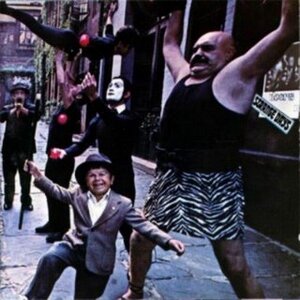
Strange Days is the second studio album by the American rock band the Doors, released on September 25, 1967, by Elektra Records. The album was a commercial success, reaching number three on the US Billboard 200, and eventually earning RIAA platinum certification. The album contains the Top 30 hit singles "People Are Strange" and "Love Me Two Times".

Waiting for the Sun is the third studio album by the American rock band the Doors. Recorded at TTG Studios in Los Angeles, the album's 11 tracks were recorded between February and May 1968 and the album was released by Elektra Records on July 3, 1968. It became the band's only number one album and included their second US number one single, "Hello, I Love You". The first single released off the album was "The Unknown Soldier," which peaked at number 39 on the Billboard Hot 100. It also became the band's first hit album in the UK, where it peaked at number 16.
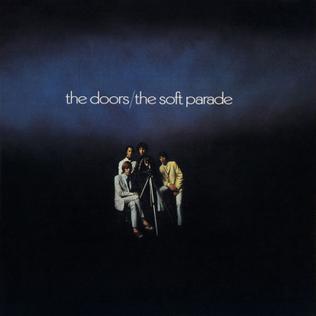
The Soft Parade is the fourth studio album by American rock band the Doors, released on July 18, 1969, by Elektra Records. Most of the album was recorded following a grueling tour during which the band was left with little time to compose new material. Producer Paul A. Rothchild recommended a total departure from the Doors' first three albums: develop a fuller sound by incorporating brass and string arrangements provided by Paul Harris. Lead singer Jim Morrison, who was dealing with personal issues and focusing more on his poetry, was less involved in the songwriting process, leaving guitarist Robby Krieger to increase his own creative output.
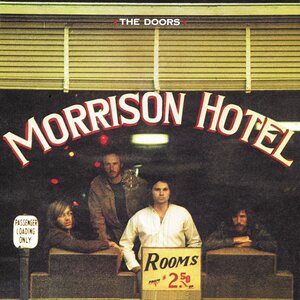
Morrison Hotel is the fifth studio album by American rock band the Doors, released February 9, 1970 by Elektra Records. Following the use of brass and string arrangements recommended by producer Paul A. Rothchild on their previous album, The Soft Parade, the band returned to their original blues-rock style and was largely seen as a return to form for the band. The Doors entered Elektra Sound Recorders in Los Angeles in November 1969 to record the album which is divided into two separately titled sides; "Hard Rock Cafe" and "Morrison Hotel". The group included session bassists Lonnie Mack and Ray Neapolitan on the album's songs.

L.A. Woman is the sixth studio album by the American rock band the Doors, released on April 19, 1971, on Elektra Records. It is the last to feature lead singer Jim Morrison during his lifetime due to his death three months after the album's release, though he would posthumously appear on the 1978 album An American Prayer. Even more so than its predecessors, the album is heavily influenced by blues. It was recorded without record producer Paul A. Rothchild after he fell out with the group over the perceived lack of quality of their studio performances. Subsequently, the band co-produced the album with longtime sound engineer Bruce Botnick.

Absolutely Live is the first live album by the American rock band the Doors, released on July 20, 1970 by Elektra Records. The double album features tracks recorded at concerts held between July 1969 at the Aquarius Theater in Hollywood and May 1970 at the Cobo Arena in Detroit. The album included the first full release of the performance piece "Celebration of the Lizard" and several other tracks that had not previously appeared on any official Doors release. At one point, lead singer Jim Morrison can be heard alluding to his prior arrest at a performance in Miami on March 1, 1969. The album peaked at number 8 on the Billboard 200 in September 1970.

"Light My Fire" is a song by the American rock band the Doors. It was recorded in August 1966 and released in January 1967 on their eponymous debut album. Released as an edited single on April 24, 1967, it spent three weeks at number one on the Billboard Hot 100 chart in late July, and one week on the Cash Box Top 100, nearly a year after its recording.

"Love Me Two Times" is a song by the American rock band the Doors. It first appeared on their second studio album Strange Days. It was edited to a 2:37 length and released as the second single from that album, and reached number 25 on the charts in the United States.

Legacy: The Absolute Best is a two-disc compilation album by American rock band the Doors, released in 2003. This compilation includes the uncensored versions of both "Break On Through " and "The End". Also included is a previously unreleased studio version of Morrison's epic poetry piece "Celebration of the Lizard," a rehearsal outtake from the band's Waiting for the Sun sessions.
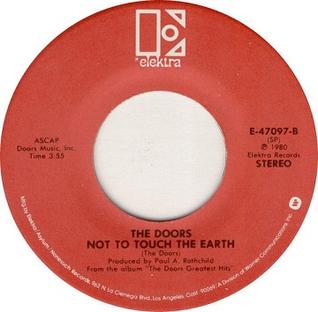
"Not to Touch the Earth" is a 1968 song by The Doors from their third album Waiting for the Sun. It is part of an extended performance piece called "Celebration of the Lizard" that the band played live multiple times. A 17-minute studio recording of the complete piece was attempted during the sessions for Waiting for the Sun, and the lyrics were printed in their entirety on the gatefold LP sleeve, but only the musical passage "Not to Touch the Earth" was included on the LP.
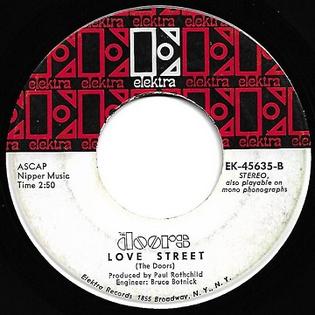
"Love Street" is a song by the American rock band the Doors which appears on their 1968 album Waiting for the Sun.
"When the Music's Over" is an epic rock song by American rock band the Doors which appears on their second album Strange Days, released in September 1967.
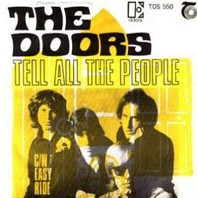
"Tell All the People" is a song by American rock band the Doors and was written by Doors' guitarist Robby Krieger. It was the A-side backed with "Easy Ride" - an outtake from Waiting for the Sun recorded in March 1968 - and was released in June 1969. It was the third single from the Doors' album The Soft Parade. It is also known as "Follow Me Down" due to the use of the phrase in the song. In the US, "Tell All the People" reached No. 57 on the Billboard Hot 100 charts, in August 1969. The US single release of the song contains a longer fade-out and runs approximately 12 seconds longer than the album version as a result.

"The Unknown Soldier" is the first single from the Doors' 1968 album Waiting for the Sun and released in March of that year by Elektra Records. An accompanying 16mm publicity film for the song featuring the band was directed and produced by Edward Dephoure and Mark Abramson. The song became the band's fourth Top 40 hit in the US, peaking at number 39 on the Billboard Hot 100, and enjoying an eight-week appearance on the Billboard Hot 100 list overall. However, due to the song's controversial lyrics many radio stations refused to play it.

"Wishful Sinful" is a song by American rock band the Doors. It was written by Doors guitarist Robby Krieger and released in March 1969 from the band's fourth album, The Soft Parade. "Wishful Sinful" follows the general theme of the album by incorporating elements of classical music. In the US, it reached No. 44 on the Billboard Hot 100 in April, 1969.

James Douglas Morrison was an American singer, songwriter and poet, who served as the lead vocalist of the rock band The Doors. Due to his wild personality, poetic lyrics, his widely recognized voice, unpredictable and erratic performances, and the dramatic circumstances surrounding his life and early death, Morrison is regarded by music critics and fans as one of the most iconic and influential frontmen in rock history. Since his death, his fame has endured as one of popular culture's most rebellious and oft-displayed icons, representing the generation gap and youth counterculture.

"Runnin' Blue" is a song written by guitarist Robby Krieger and performed by the Doors. Elektra Records released it in August 1969 as the fourth single from the band's fourth album The Soft Parade, backed with "Do It". The single peaked at No. 64 on the Billboard Hot 100 chart.

London Fog 1966 is a live album by the American rock band the Doors, released on December 16, 2016 by Rhino Records. It contains a previously unreleased live performance at the London Fog in Los Angeles in May 1966. It was recorded by spectator Nettie Pena before the band released their highly successful debut album on January 4, 1967. Considered the earliest known live recording of the Doors, London Fog 1966 includes versions of eventual album tracks and covers of blues standards.
A Tribute to Jim Morrison is a 1981 documentary about Jim Morrison, lead singer of American rock band the Doors who died in July 1971.
References
- ↑ "The Hot 100 - May 18, 1968". Billboard. Retrieved July 19, 2020.
- ↑ Weldman, Rich (2011). The Doors FAQ: All That's Left to Know About the Kings of Acid Rock. ISBN 978-1617131141.
- ↑ Danny Sugerman; Jerry Hopkins (1980). No One Here Gets Out Alive. ISBN 0-7607-0618-2.
- ↑ Weldman, Rich (2011). The Doors FAQ: All That's Left to Know About the Kings of Acid Rock. ISBN 978-1617131141.
- ↑ "Music Review: The Doors: Waiting For The Sun". Slant Magazine . October 18, 2008. Retrieved July 19, 2020.